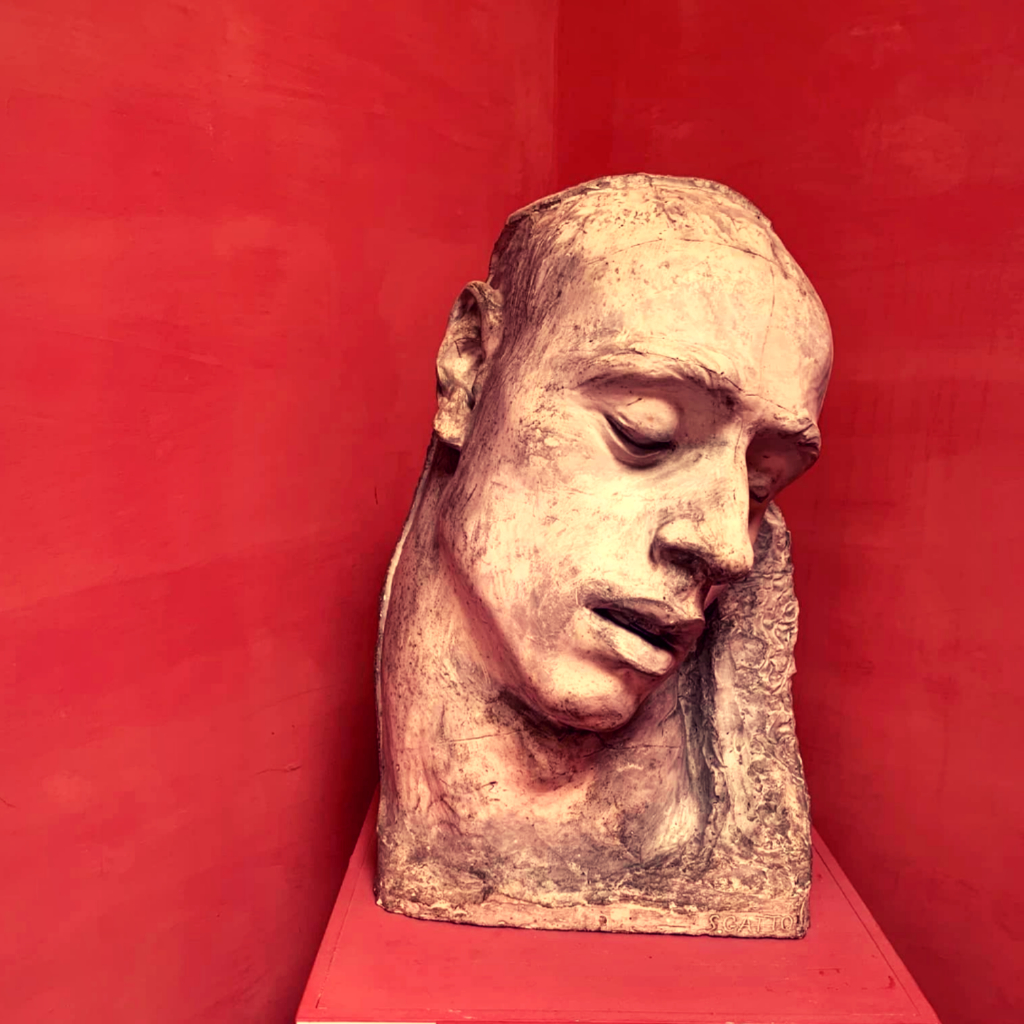
During the performance, the conductors has an enormous responsibility, because he or she must, without distraction for a split second, see and hear everything, think and show with their hands the necessary tasks. It’s a lot of intellectual and physical activity, which with every rehearsal and concert is a little bit easier.
Conductors can change, for example, the composer’s tempo and dynamic instructions, believing that they will make the work better; sometimes they edit the unsuccessful parts of the orchestration. Sound, except for the technical errors of the orchestra, is a result that depends solely on the conductor. We think that the main task of a professional is to convey the score correctly, respectfully and delicately to the listeners. The score is filled with a lot of instructions, but how it sounds is determined by the conductor’s work as an intellectual unit – that’s the interpretation of the work.
Until a hundred years ago conductors changed in orchestras rarely, so the process of «scratching» was much longer than today. Now it takes a maximum of a few rehearsals, though much depends on the professionalism of the musicians. Technical unpreparedness can be encountered: it is difficult to draw up a work plan when one group is very heterogeneous, there are strong musicians and weaker musicians. This has happened to both choir and chamber orchestras. Sometimes there are conflicts, but unlike technical problems, a conductor can solve them quickly.
Women in the world are not always at the top. Not seldom, when they have to hear from the «honorary professorship», that they «are too confident in themselves», «conduct as men», should «come to the tests on conducting in more feminine, tighter things», and also that «the main thing in a woman’s life is the family».
TOP-10 Women Conductors
Marin Alsop is an American conductor and violinist. She is currently music director of the Baltimore Symphony Orchestra, as well as, chief conductor of the Vienna Radio Symphony Orchestra, and the Ravinia Festival. In 2020 she was elected to the American Philosophical Society.
Susanna Mälkki is a Finnish conductor and cellist. She continued her cello studies with Hannu Kiiski, and later studied conducting with Jorma Panula, Eri Klas, and Leif Segerstam at the Sibelius Academy. She also studied at London’s Royal Academy of Music. She participated in a Sibelius Academy Conductor’s Workshop at Carnegie Hall in 1998, under the supervision of Panula and Esa-Pekka Salonen.
Simone Young is an Australian conductor. This season’s engagements include the Zurich Opera (Salome), the Berlin State Opera (Der Rosenkavalier), the Vienna State Opera (Peter Grimes, Das verratene Meer) and the Opéra national de Paris (Parsifal). In the symphonic field she conducts the Orchestre de Chambre de Lausanne, the Royal Philharmonic Orchestra, the New York Philharmonic, the LA Phil, the San Francisco Symphony Orchestra, the Washington National Symphony Orchestra and the Oslo Philharmonic Orchestra.
Emmanuelle Haïm is a French harpsichordist and conductor with a particular interest in early music and Baroque music. In 2021-2022, Emmanuelle Haïm went to Madrid to direct the Orquesta nacionales de España. With the Concert d’Astrée, she presents Idoménée de Campra (directed by Àlex Ollé/La Fura dels Baus – Opéra de Lille and Staatsoper Berlin), Cosi fan tutte de Mozart (directed by Laurent Pelly – Théâtre des Champs-Elysées and Théâtre de Caen), as well as a cover of Purcell’s Dido and Æneas (Franck Chartier/Peeping Tom – Opéra de Lile and Grand Théâtre de Luxembourg). Autumn 2021 will be marked by the celebration of the 20th anniversary of the Concert d’Astrée: a Gala will be held at the Staatsoper in Berlin under the direction of Simon Rattle, and in Paris at the Théâtre des Champs-Elysées. From 2021 to 2023, Emmanuelle Haïm was head of residency at the Centre de Musique Baroque de Versailles.
Dame Jane Alison Glover is a British-born conductor and musicologist. Acclaimed British conductor Jane Glover, named Dame Commander of the Order of the British Empire in the 2021 New Year’s Honours, has been Music of the Baroque’s music director since 2002. She made her professional debut at the Wexford Festival in 1975, conducting her own edition of Cavalli’s LʼEritrea. She joined Glyndebourne in 1979 and was music director of Glyndebourne Touring Opera from 1981 until 1985. She was artistic director of the London Mozart Players from 1984 to 1991, and has also held principal conductorships of both the Huddersfield and the London Choral Societies. From 2009 until 2016 she was Director of Opera at the Royal Academy of Music where she is now the Felix Mendelssohn Visiting Professor. She was recently Visiting Professor of Opera at the University of Oxford, her alma mater.
Alondra de la Parra has gained widespread attention for her spellbinding and vibrant performances and her commitment to Latin American composers. She frequently works with some of the world’s most prestigious orchestras including Orchestre de Paris, London Philharmonic Orchestra, Tonhalle-Orchester Zurich, Swedish Radio Orchestra, São Paulo Symphony Orchestra, Berlin Radio Symphony Orchestra and Orchestra dell’Accademia Nazionale di Santa Cecilia. In 2017 she began her term as Music Director of the Queensland Symphony Orchestra, making her the first ever Music Director of an Australian orchestra. She holds the distinction of being the first Mexican woman to conduct in New York City and is an official Cultural Ambassador of Mexico.
Mirga Gražinytė-Tyla was named Music Director of the City of Birmingham Symphony Orchestra in February 2016 following in the footsteps of Sir Simon Rattle, Sakari Oramo and Andris Nelsons. Her Music Directorship was extended through the 2020-21 season. Winner of the 2012 Salzburg Festival Young Conductors Award, she subsequently made her debut with the Gustav Mahler Youth Orchestra in a symphonic concert at the Salzburger Festspiele.
Elim Chan is a Hong Kong conductor. Elim Chan has been the chief conductor of the Antwerp Symphony Orchestra from the 2019-2020 concert season, and has been the permanent guest conductor of the Royal Scottish National Orchestra from the 2018-2019 season.
Barbara Hannigan CM is a Canadian soprano and conductor, known for her performances of contemporary opera. The 20/21 season presented both challenges and opportunities, and true to form, Barbara continued at her own speed of light, premiering a new live video production of La Voix Humaine in which she both sings and conducts, created in collaboration with video artist Denis Guéguin as part of her residency with l’Orchestre Philharmonique de Radio France. She performed across Europe with colleagues including Sir Simon Rattle and the LSO, Danish Radio Symphony Orchestra, Gothenburg Symphony, Munich Philharmonic, festivals in Ludwigsburg and Aix en Provence, and celebrated her 50th birthday at the Concertgebouw in Amsterdam, conducting the Ludwig Orchestra in works of Haydn, Copland, Barry and two Kurt Weill songs arranged for Barbara by Bill Elliott.
Nathalie Stutzmann is a French contralto and conductor. She has just been announced as Atlanta Symphony’s Music Director from the start of the 2022/23 season, becoming only the second woman in history to lead a major American orchestra after Marin Alsop. In addition, this season she begins her position as the Philadelphia Orchestra’s new Principal Guest Conductor. The three-year tenure will involve a regular presence in the orchestra’s subscription series in Philadelphia and at its Summer festivals in Vail and Saratoga. Finally, Nathalie is also entering the fourth season of a highly successful tenure as Chief Conductor of the Kristiansand Symphony Orchestra, a tenure which has just been extended by a further two seasons, to the end of 22/23.
However, even women themselves think of women conductors in a derogatory manner. This status quo is convenient to support those who benefit from it. For example, it is not uncommon for successful female conductors to maintain stereotypes and downplay other women because they see them as competitors.
It’s nice that they’re looking for a different approach now. For example, the most successful female conductor in the United States, Marin Alsop, does a number of projects to support young female conductors. The percentage of women conductors in serious positions is changing – too slowly, though. The younger generation of musicians is much more open to women behind the conductor board.



